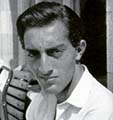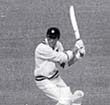|
October 13, 1997
NEWS
MATCH REPORTS
STAT SHEET
DIARY
HOT LINKS
OTHER SPORTS
SLIDE SHOW
BOOKS & THINGS
DEAR REDIFF
|
The Cricket Interview/Mansur Ali Khan Pataudi
'Gavaskar was the best I've seen...'
 Why is it that good cricketers don't necessarily make good captains?
Why is it that good cricketers don't necessarily make good captains?
One of the reasons why some of the most natural natural players don't make good captains, people like Gary Sobers for instance, is because things came naturally to them, they have never had to study the game. As a result, they made poor captains and even poorer coaches. The people who have had to struggle hard, to study the game, may not have played with the kind of brilliance the naturals have displayed, but they did turn out to be good captains.
Ray Illingworth and Mike Brearley, for instance, were fine captains, but on most occasions, hardly worth their place in the team. So, not only do you not need to be an outstanding cricketer to be a good captain, quite often it actually helps you to be less talented.
So what special qualities should a good captain possess?
He has to be totally above board, so that no member of the team has the feeling you are putting yourself ahead of others. Complete integrity is essential, nobody should feel that you are either supporting or helping someone at the expense of others, or that you are not thinking of the team. Specially in the Indian context, where you have a tremendous mix of backgrounds and cultures, languages and regional set-ups and so on, the captain must be a total team man.
Do you also subscribe to the theory that bowlers made bad captains?
There are examples of some bowlers being good captains -- Richie Benaud is an obvious example -- so I don't think it is necessarily true. But I think it is easier if you are a batsman. In Imran Khan's case, he was so enormously talented with both ball and bat, which contributed to his success. The most crucial captaincy decisions are made while you are fielding. A bowler as captain tends to either underbowl himself, or go to the other extreme and try to do it all. It is difficult for a bowler to look at things dispassionately -- but this again is not true of everybody.
Is it tougher to captain in a one-day game because if you make a mistake, there is no time to recover?
No, I don't think so. Though a Test match is longer, decisions have to be taken fairly quickly and you may have to change them equally quickly as the situation changes. And although the longer game may not look as frenetic as the one-day game, captaincy in a Test can be more taxing. Sure, in ODIs, if the two teams are evenly matched, you may not get a second chance -- but then, that is one of the charms of the longer matches.
Again, in ODIs, the effects of a bad shot or a missed catch can be more crucial than a tactical blunder by the captain. True, whether a bowler should continue or be taken off, for instance, can make a difference -- but after you have captained the side for some 20 matches, you get an automatic feel for these things.
Is the one day game predictable in terms of strategy -- in the sense that bowling changes and field settings can be anticipated?
Yes, it is pretty predictable in most cases, though there are rare occasions when the bowler might have to bowl his overs through at a stretch, because he keeps getting wickets and the captain is torn between taking him off, and keeping him on in the hope of getting even more wickets.
Do you think captaincy has become more difficult in today's context, where decisions are scrutinised, and there is more public and media attention focussed on the game?
Captaincy is not more difficult. What has changed is that the pressures have increased with the increase in scrutiny. But the mechanics of captaincy are the same as before. Even earlier, your mistakes were commented upon, but then you didn't have 20 million people watching you on television. To that extent, the pressure has multiplied -- but captaincy is what you do on the field, criticism and the pressures it brings happen outside the field.
Is the pressure greater in India than in other countries?
In India and also Pakistan. In other countries, people tend to be more charitable towards the captain. But in these two countries we don't seem to take a balanced view -- we either make them into Gods or drop them into the gutter! If you win you are great, if you lose you are awful. In that sense, it is more difficult to captain India.
Do you approve of the idea of having a cricket manager?
I do, yes, as long as he does not interfere.
But he is meant to interfere!
Only in certain areas. He can't interfere, for example, in change of bowling. He can contribute to team discussions back in the dressing room, but I do not think he should interfere during the course of the game, that will only cause confusion. It also makes a captain irrelevant. You might as well have the sort of manager you have in hockey or soccer, where they sit on the sidelines and yell instructions and control the game.
So where do you see the manager contributing?
On a tour, many things happen that people are not aware of. For instance, youngsters feel homesick, they actually miss home -- there are frequent instances of people actually crying because they are feeling lost and lonely, and today it is worse than in our time because tours are longer and more frequent, and there is less time spent at home. These are the kind of things the manager could easily take care of. Otherwise, this will eat into the captain's time, which is better saved for thinking of onfield matters. Also organising functions and giving speeches becomes the manager's role.
You have been captain, now you are editor of a magazine. How do you react to team members writing columns in newspapers, commenting on play?
I disapprove. As an editor, I think they don't write what they should be writing anyway, and besides, they don't write, their ghosts write for them. And what is finally printed is a watered down version of what actually happened -- so for me, the whole exercise of getting team players to write is not worth it. Also, as a matter of principle, I disagree because I don't think one player should comment on the performance of his colleagues. You could also have a team member blasting his captain in his column -- which is not particularly conducive to morale.
 Enormous amounts of money have come to be associated with cricket these days. Has this upped the stakes, made winning and losing more important and, as a result, lowered levels of sportsmanship?
Enormous amounts of money have come to be associated with cricket these days. Has this upped the stakes, made winning and losing more important and, as a result, lowered levels of sportsmanship?
I don't think winning was any less important for us -- but I suppose because of the monetary aspect today, it is perhaps more rewarding when you win. While we didn't have these financial benefits, we did have a tremendous sense of pride in winning for the country, and that compensated for not being paid as well as today's cricketers are. Again, it is not as if increased money has increased the performance. From the time of Nari Contractor, which was when the Indian team began to be taken seriously, the win percentages of captains has remained fairly static except for the time Wadekar won those three series.
But at the time Wadekar was a bit lucky, and we reverted to losing fairly soon. What we, Contractor first and then me, did not have in those days was a player like Gavaskar who could bat for two days to make sure you did not lose too many matches. If you won one, he would draw others and you still won the series.
Did you ever have differences with the Selection Committee?
Only with Vijay Merchant.
Over what?
He was keen on picking junior players purely on the basis of youth, not because they were good enough. And there were a number of players who were better than the juniors. We had long arguments over this, and a number of players were chosen who were not good enough to play for the country. One had no objection to selecting players if they are good, I must add.
You were pushed into captaincy very early in your career. How difficult was it at the time?
Nari got injured in the West Indies, and I suddenly found myself becoming captain. But I had been captaining the University side in England before that, and those were first class games. County cricket was highly professional and due to that exposure, one was not completely naive about captaincy. But at the same time, when leading the national side, one realised that there was a great deal to learn.
Which captains do you rate very high?
Among the ones I have seen, Richie Benaud was the best -- to my mind a great captain. Then there was Brearley, and in his case the results are for everyone to see. But he was a bit over-rated, in my opinion. He had a vast knowledge of the human mind -- but captaincy is not as complicated as that. You don't have to get deep into the minds of your players. And how is one supposed to get deep into the minds of pace bowlers anyway? Basically, you have to get the guy on your side somehow, that is all.
Again, Imran Khan rates pretty high, though not as high as Richie Benaud. Imran had a sound knowledge of the game, he led from the front in the sense that when he was not getting wickets he got runs. And he produced results for his team.
Unfortunately, I have not played under too many Indian captains, so I don't really know enough to rate them -- I had two matches under Contractor and two under Wadekar, that's all. All things considered, I would have to say that Gavaskar was the best I have seen in the last 20 or 25 years. But I must say my judgement is only from a distance.
|

